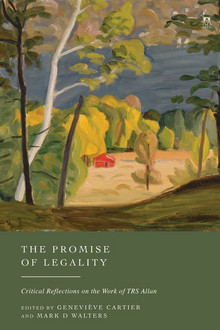Han-Ru Zhou, « Unwritten Constitutional Principles and the Argument from Extreme Cases » dans G. Cartier et M.D. Walters (dir.), The Promise of Legality: Critical Reflections upon the Work of TRS Allan (Oxford : Hart 2024)
Résumé en anglais uniquement :
This chapter seeks a possible broader consensus regarding the exercise of judicial review based on unwritten constitutional principles (UCPs) by taking a ‘bottom-up’ or practice-based approach in examining and connecting a series of leading cases that are considered to exemplify the prevailing position under Westminster constitutions. From this perspective, the argument from extreme cases can offer some renewed potential. Section 2 presents two well-known types of extreme cases that involve ad hominem criminal laws and ‘full’ privative (or ouster) clauses. Despite extensive judicial and academic efforts to portray the resulting decisions as the product of a standard interpretation of the constitutional instrument, these decisions evidence the use, across the Commonwealth, of UCPs as a basis for the exercise of judicial review. Section 3 seeks to explain and justify the use of UCPs by identifying, mainly from TRS Allan’s work, three characteristics of extreme cases and then testing them on the constitutional evaluation of ad hominem laws and privative clauses. It should follow that, in legal systems with a Westminster constitution, there are cases, identifiable by three characteristics, that require the intervention of UCPs failing the application of relevant constitutional provisions. While there will always be deep disagreements regarding UCPs, it is hoped the fact of their unavoidability in conducting judicial review can be generally accepted and future debates can better focus on the search for a methodology or the conditions of their operation.









